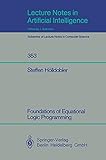Foundations of Equational Logic Programming [electronic resource] / edited by Steffen Hölldobler.
Material type: TextSeries: Lecture Notes in Computer Science, Lecture Notes in Artificial Intelligence ; 353Publisher: Berlin, Heidelberg : Springer Berlin Heidelberg, 1989Description: XII, 256 p. online resourceContent type: text Media type: computer Carrier type: online resourceISBN: 9783540482260Subject(s): Computer science | Artificial intelligence | Computer Science | Artificial Intelligence (incl. Robotics) | Mathematical Logic and Formal Languages | Programming Languages, Compilers, InterpretersAdditional physical formats: Printed edition:: No titleDDC classification: 006.3 LOC classification: Q334-342TJ210.2-211.495Online resources: Click here to access online
TextSeries: Lecture Notes in Computer Science, Lecture Notes in Artificial Intelligence ; 353Publisher: Berlin, Heidelberg : Springer Berlin Heidelberg, 1989Description: XII, 256 p. online resourceContent type: text Media type: computer Carrier type: online resourceISBN: 9783540482260Subject(s): Computer science | Artificial intelligence | Computer Science | Artificial Intelligence (incl. Robotics) | Mathematical Logic and Formal Languages | Programming Languages, Compilers, InterpretersAdditional physical formats: Printed edition:: No titleDDC classification: 006.3 LOC classification: Q334-342TJ210.2-211.495Online resources: Click here to access online  E-BOOKS
E-BOOKS
| Current library | Home library | Call number | Materials specified | URL | Status | Date due | Barcode |
|---|---|---|---|---|---|---|---|
| IMSc Library | IMSc Library | Link to resource | Available | EBK6374 |
Preliminaries -- Equational Logic Programming -- Universal Unification -- SLDE-Resolution -- Paramodulation -- Universal Unification by Complete Sets of Transformations -- Lazy Resolution and Complete Sets of Inference Rules for Horn Equational Theories -- Conclusion.
Equations play a vital role in many fields of mathematics, computer science, and artificial intelligence. Therefore, many proposals have been made to integrate equational, functional, and logic programming. This book presents the foundations of equational logic programming. After generalizing logic programming by augmenting programs with a conditional equational theory, the author defines a unifying framework for logic programming, equation solving, universal unification, and term rewriting. Within this framework many known results are developed. In particular, a presentation of the least model and the fixpoint semantics of equational logic programs is followed by a rigorous proof of the soundness and the strong completeness of various proof techniques: SLDE-resolution, where a universal unification procedure replaces the traditional unification algorithm; linear paramodulation and special forms of it such as rewriting and narrowing; complete sets of transformations for conditional equational theories; and lazy resolution combined with any complete set of inference rules for conditional equational theories.


There are no comments on this title.